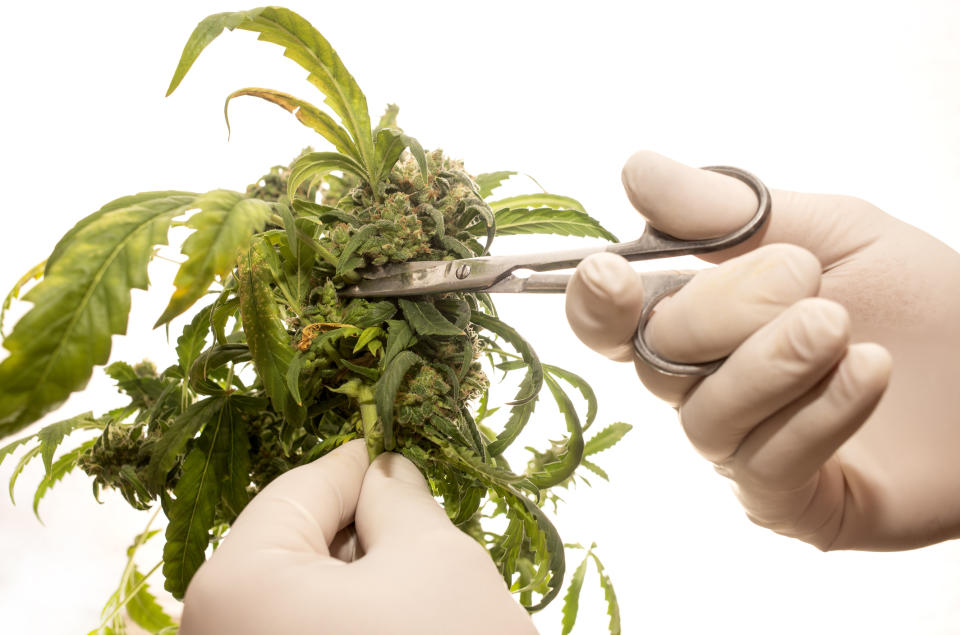5 Cannabis Industry Myths That Aurora Cannabis Wants to Clear Up
Aurora Cannabis (NYSE: ACB) claims the largest funded production capacity among Canadian cannabis producers. It's the second-largest cannabis producer in the world in terms of market cap, and operates in 24 countries spanning five continents. It's probably fair to say that the Aurora executives have expertise in the cannabis industry.
That's important to note because there are a few things people believe about the cannabis industry that Aurora thinks are incorrect. Vice president of investor relations Marc Lakmaaker spoke at a virtual investor conference on Tuesday hosted by OTC Markets. He specifically mentioned five myths about the cannabis industry that Aurora wants to clear up.

Image source: Getty Images.
1. A supply glut is on the way
You've heard it and I've heard it: A supply glut is coming for the Canadian cannabis market. Lakmaaker acknowledged in his comments on Tuesday that there's plenty of talk about a looming supply glut. But he stated point blank, "We're not really seeing it." Lakmaaker said a lot of companies projected production capacity that hasn't materialized yet.
More importantly, he emphasized that Aurora is looking at a global cannabis market that's far larger than Canada alone. Lakmaaker mentioned that Aurora CEO Terry Booth likes to say that the thing that keeps him up at night is not being able to supply enough product to meet the growing demand globally. Aurora is putting its money where its mouth is on this front: The company announced in April that it's boosting production capacity at its Aurora Sun facility.
2. Canadian medical cannabis isn't a growth market
Many people assumed that the Canadian medical cannabis market would be flat at best or even decline following the legalization of adult-use recreational marijuana. Lakmaaker said unequivocally that isn't the case at all.
He noted that there are significant financial incentives for patients to stay within the medical system in Canada instead of obtaining cannabis through retail channels. Lakmaaker added that there are a growing number of private companies offering coverage for medical cannabis. Sure, the adult-use recreational market is much larger, but investors shouldn't overlook the continued growth opportunities in Canada's medical cannabis market.
3. Retail cannabis growth is sluggish in Canada
Speaking of the adult-use market, Lakmaaker mentioned that the media has focused on low retail cannabis sales growth in Canada. Scotiabank even slashed its revenue outlook for Aurora's main rival, Canopy Growth, on concerns about the retail environment in Canada.
Lakmaaker disagrees with the negativity, and Aurora's latest quarterly performance backs him up: The company posted 37% quarter-over-quarter sales growth from the consumer cannabis market. While Lakmaaker acknowledged that the limited brick-and-mortar retail infrastructure has held back the recreational market somewhat, he expressed optimism that more licensing is on the way for retail locations.
4. There are only two major cannabis markets: medical and recreational
Nearly everyone who follows the cannabis industry thinks primarily in terms of two major markets, medical and adult-use recreational. But Lakmaaker stated that a third market is emerging: the wellness market.
Products that contain cannabidiol (CBD) are especially hot. Cannabis market researcher Brightfield Group thinks that the CBD market "has gotten a significantly stronger foothold across European states than has medical cannabis." Brightfield projects that European CBD sales will skyrocket from $318 million in 2018 to nearly $1.7 billion by 2023.
5. The global cannabis market is highly fragmented
Another myth that some might believe is that the global cannabis market is highly fragmented. Lakmaaker said that although the U.S. market is fragmented, the rest of the international cannabis market is actually concentrated with only a few major players.
Aurora, of course, is one of those major contenders in the global market. Lakmaaker said that the company has a 40% market share in cannabis flower in Germany, the largest legal cannabis market outside of North America. One of the highlights of Aurora's latest quarterly results was quarter-over-quarter international sales growth of 38%.
Evaluating Aurora's myth-busting
Most of what Lakmaaker said can be supported by facts. He's right that the Canadian medical cannabis and retail cannabis markets continue to grow impressively. He's on target with his observations about the emerging cannabis wellness market, and that the global cannabis market outside of the U.S. really isn't very fragmented right now.
But the biggest question mark related to Aurora's myth-busting is about the possibility of a supply glut. Although some cannabis growers haven't delivered on the production capacity they said they'd have, it still seems likely that supply will exceed demand in Canada within a few years.
Aurora Cannabis and several of its peers think that the global cannabis market will grow so much that any excess capacity in Canada will be absorbed elsewhere. The challenge is that it's hard to predict how quickly those markets will ramp up. I suspect that Aurora's optimism is probably right. But there's at least a small chance that in a few years, the feared supply glut will prove to be a reality rather than a myth.
More From The Motley Fool
Keith Speights has no position in any of the stocks mentioned. The Motley Fool has no position in any of the stocks mentioned. The Motley Fool has a disclosure policy.